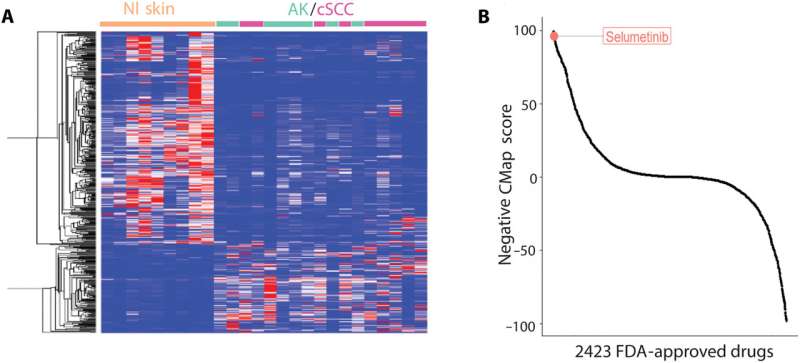This article has been reviewed according to Science X's editorial process and policies. Editors have highlighted the following attributes while ensuring the content's credibility:
fact-checked
peer-reviewed publication
trusted source
proofread
Novel drug, NFX-179, found to inhibit MEK activity, prevent cutaneous squamous cell carcinoma development

Cutaneous squamous cell carcinoma is the second most common type of skin cancer in the United States, impacting approximately 700,000 people each year. While medications exist to prevent the development of disease, they are associated with side effects, suggesting the need for new drugs that can be safely used to prevent it.
In a new article published today in Science Translational Medicine, a team of Moffitt Cancer Center researchers, in collaboration with NFlection Therapeutics and researchers at Stanford University, reports the identification of a new drug, NFX-179, that can be applied to the skin and was shown to prevent the development of cutaneous squamous cell carcinoma in pre-clinical models.
Cutaneous squamous cell carcinoma is an extremely common malignancy and while most cases can be treated by surgical removal, approximately 5% of cases are more advanced and require additional therapy. Given the high incidence of cutaneous squamous cell carcinoma and mortality associated with advanced disease, researchers have been trying to develop drugs that can be used to prevent disease development.
"Our previous work showed that the canonical mitogen-activated protein kinase (MAPK) signaling pathway is important for the development of cutaneous squamous cell carcinoma. Our new study expanded on this, by showing that drugs that target the extracellular signal-regulated kinase (ERK) MAPK pathway, including MAP2K / MEK inhibitors, may be an effective approach to prevent the development of cutaneous squamous cell carcinoma," said Kenneth Tsai, M.D., Ph.D., vice chair of Research Pathology and senior member of the Cancer Biology & Evolution Program.
While several MEK inhibitors are already approved to treat advanced cancers, such as melanoma and non-small cell lung cancer, these drugs must be given orally and are associated with side effects that would limit their continuous use, particularly in the context of cancer prevention.
Tsai and a team of researchers sought to develop a drug to specifically target the MEK1/2 proteins that could be applied topically on a regular basis. Because of its continuous use, they also needed the drug to have minimal to no side effects. Therefore, the drug had to penetrate the upper epidermal and lower dermal layers of the skin while retaining high potency and being rapidly cleared from circulation to limit side effects.
The researchers designed and screened over 100 compounds and identified the drug NFX-179 that fit their requirements. They performed a series of pre-clinical experiments in mouse models and discovered that a gel formulation of NFX-179 reduced the formation of new cutaneous squamous cell carcinomas by up to 92% at the highest doses. Additionally, the effects of the NFX-179 gel were localized, as inhibition of cutaneous squamous cell carcinoma development was observed only in areas that were treated with the drug, and no systemic toxicities were observed.
"Our data provide compelling rationale for using metabolically labile topical MEK inhibitors such as NFX-179 as an effective strategy for cutaneous squamous cell carcinoma chemoprevention. NFX-179 gel appears safe, tolerable and highly efficacious in pre-clinical model systems," Tsai said.
More information: Kavita Y. Sarin et al, Development of a MEK inhibitor, NFX-179, as a chemoprevention agent for squamous cell carcinoma, Science Translational Medicine (2023). DOI: 10.1126/scitranslmed.ade1844
















